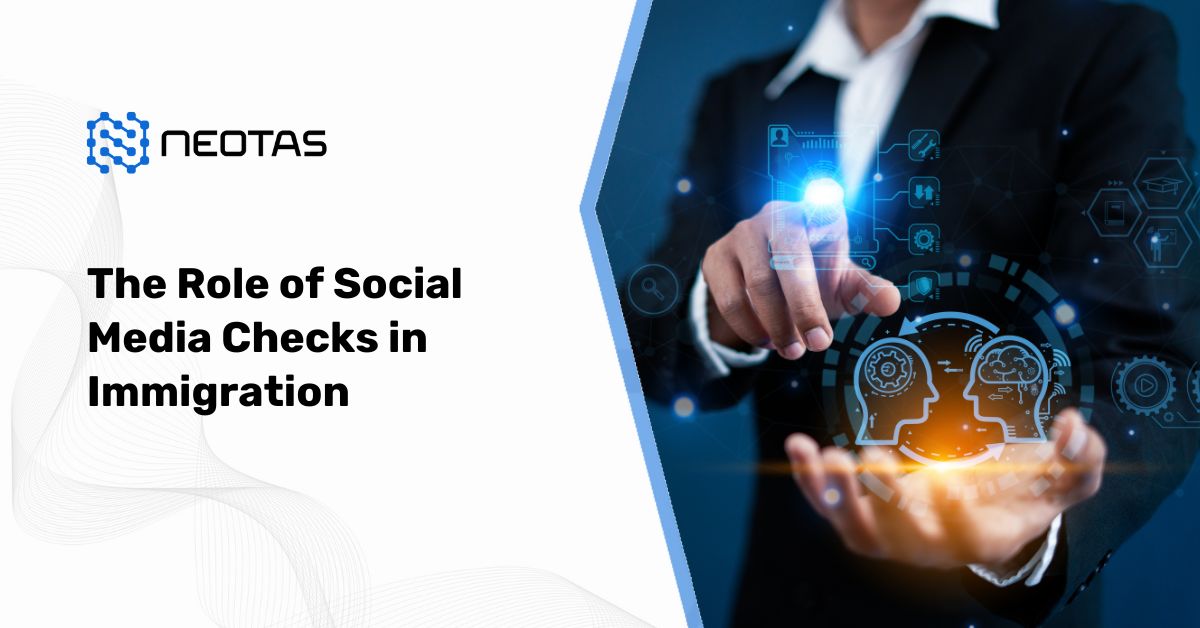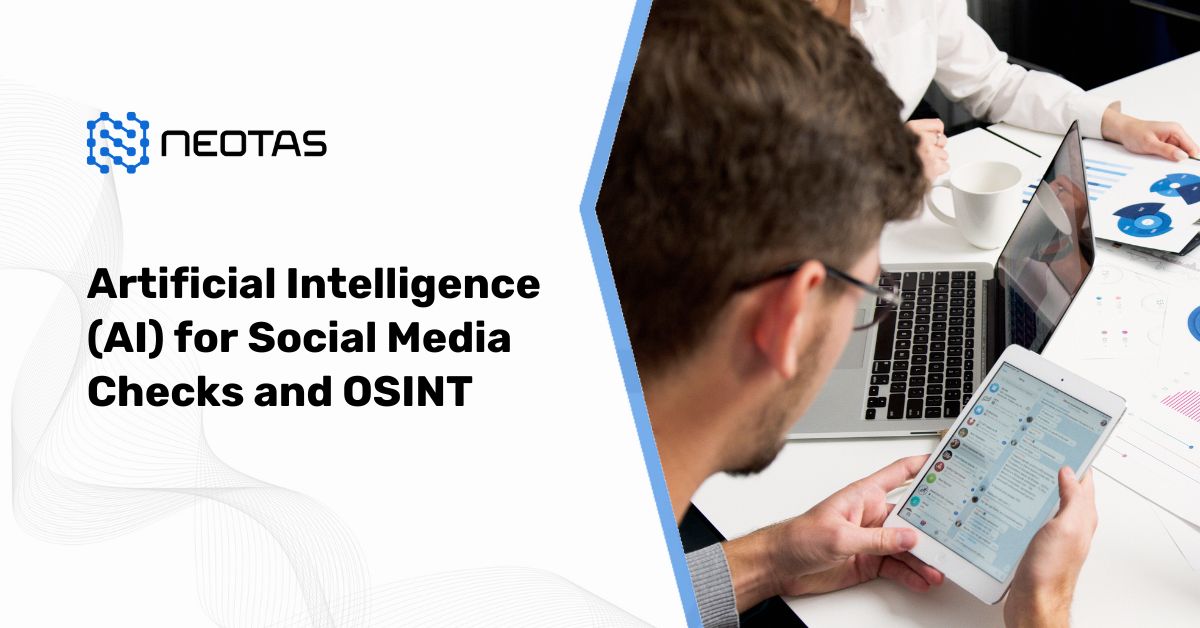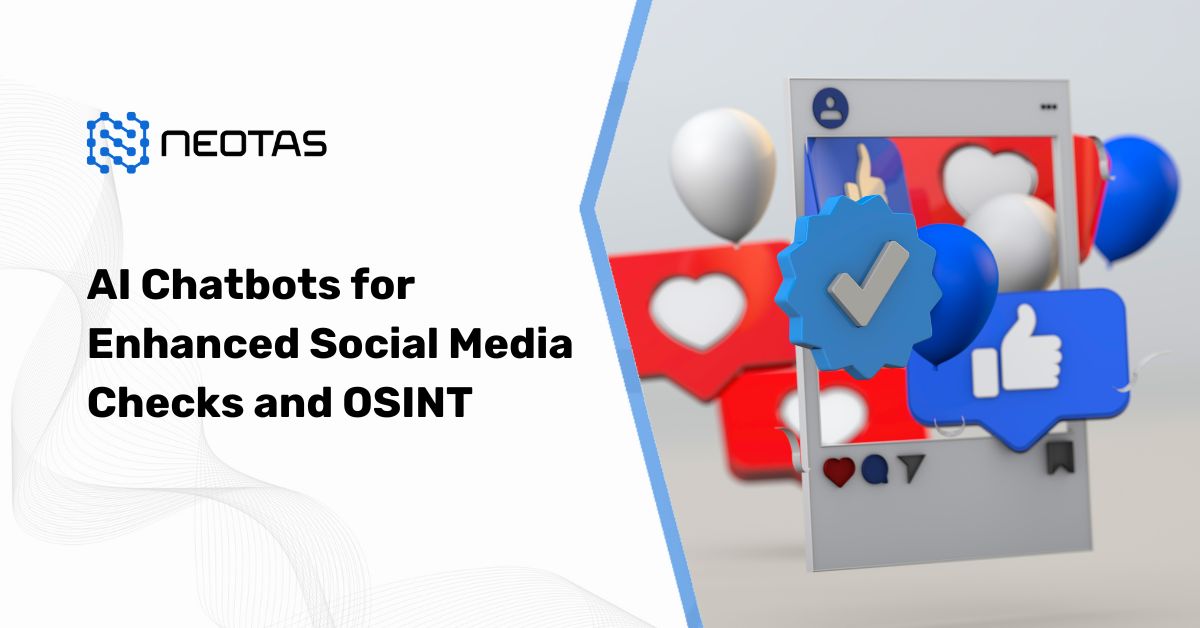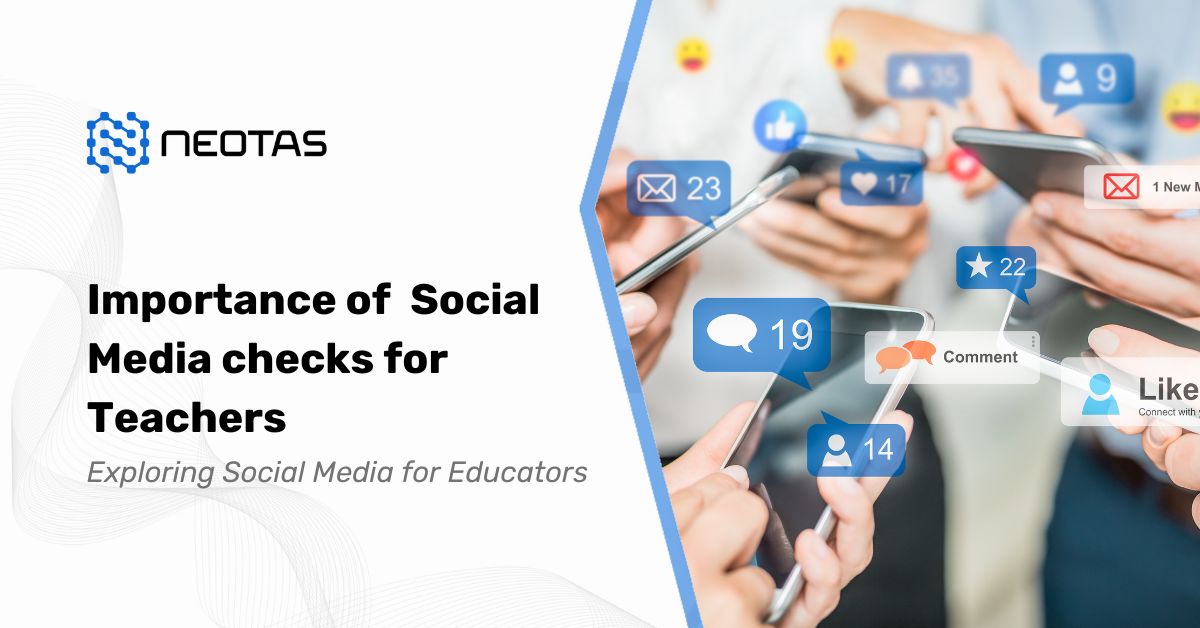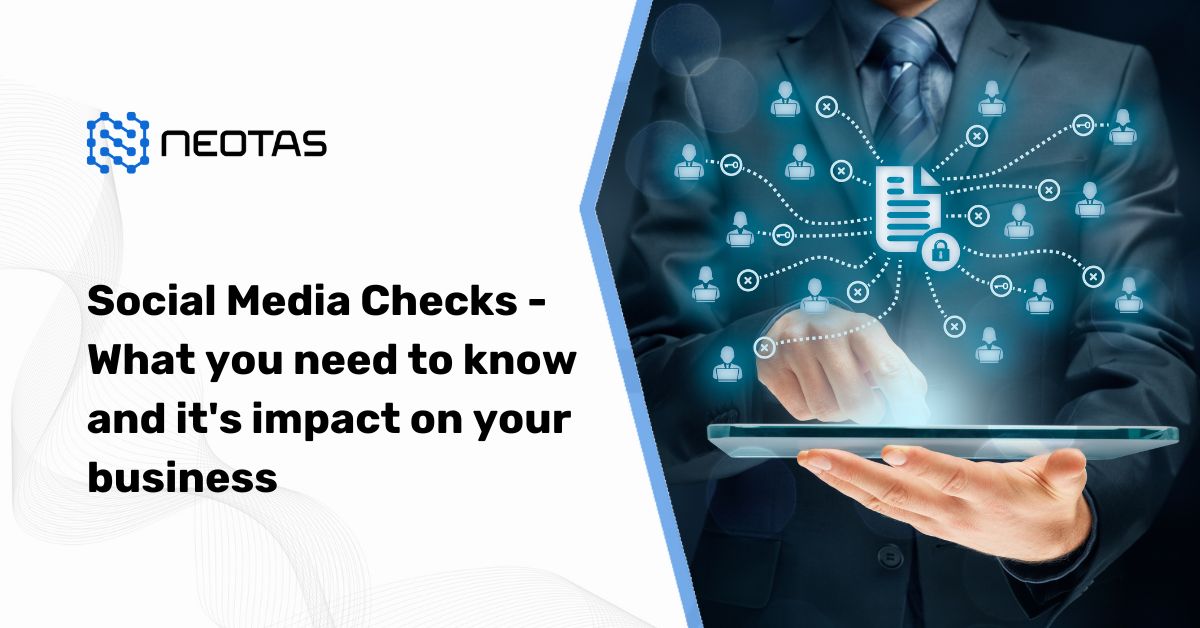Social Media Background Checks
Employers, recruiters, and compliance officers—navigating hiring risks, bias prevention, and privacy laws is more critical than ever. A single mistake in social media screening can lead to lawsuits & reputational damage. Are Your Social Media Background Checks Legally Sound?
In today’s digital-first world, social media background checks have become an essential tool for employers looking to gain deeper insights into job candidates beyond their CVs and interviews.
With 85% of recruiters now incorporating social media screening into their hiring process, businesses are increasingly relying on these checks to evaluate a candidate’s professional conduct, cultural fit, and potential risks. However, the process is fraught with legal and ethical challenges, including compliance with FCRA (US), EEOC (US), GDPR (UK & EU), and CCPA (US) regulations, as well as concerns over privacy, discrimination, and unconscious bias.
This comprehensive guide is designed to help HR professionals, recruiters, hiring managers, compliance officers, and business owners navigate the complexities of ethical and legally compliant social media screenings. It will cover:
- What employers should and shouldn’t look for in a candidate’s online presence.
- US & international legal considerations to ensure compliance with privacy laws.
- The risks of DIY social media screening and why professional vetting is safer.
- Best practices for implementing a fair and effective screening policy.
- Future trends in AI, automation, and evolving data privacy laws.
As digital footprints become increasingly scrutinised, businesses must find the right balance between privacy, fairness, and risk mitigation. This guide provides expert analysis, legal references, and practical strategies to help organisations conduct ethical and legally sound social media background checks in 2025 and beyond.

- Are social media background checks legal in the US?
- What do employers typically assess in a candidate’s online presence?
- How can businesses avoid legal risks and unconscious bias in hiring?

Table of Content
- Why Social Media Background Checks Are Essential in 2025
- How Employers Use Social Media Screening: Key Benefits & Risks
- Legal & Compliance Framework: What Employers Must Know (FCRA, GDPR, EEOC, CCPA, + Industry-Specific Laws)
- Ethical Considerations: How to Avoid Hiring Bias & Discrimination
- Step-by-Step Guide: How to Conduct a Legal & Ethical Social Media Background Check (Checklist & Do’s/Don’ts Table)
- The Role of AI in Social Media Screening: Opportunities & Risks
- Employee Social Media Monitoring: What Employers Can & Cannot Do (Case Studies & Legal Precedents)
- Final Takeaways: How HR Can Build a Fair & Compliant Screening Policy
Social Media Background Checks
A social media background check is the process of reviewing a job candidate’s online presence to assess their professionalism, cultural fit, and potential risks. Employers examine publicly available content on platforms such as LinkedIn, Twitter, Facebook, Instagram, and TikTok to gain additional insights beyond traditional CVs and interviews.
This practice helps organisations identify red flags (e.g., offensive content, discriminatory remarks, or unprofessional behaviour) and positive traits (e.g., thought leadership, industry engagement, or strong communication skills). However, legal and ethical considerations must be carefully managed to avoid discrimination, bias, and breaches of privacy laws such as GDPR, FCRA, EEOC, and CCPA.
Why Social Media Background Checks Are Essential in 2025
The role of social media in recruitment and hiring has grown significantly in recent years. Employers are no longer relying solely on CVs, references, and interviews—they are also assessing a candidate’s digital footprint to make more informed hiring decisions.

- 92% of employers use social media sites to find talent. (EnterpriseApps)
- 82% of employers use social media to hire passive job seekers. (SHRM)
- 54% of employers have eliminated candidates based on their social media feeds. (Harvard Business Review)
- 70% of employers believe that companies should screen candidates’ social media profiles during the hiring process to ensure alignment with company values and culture. [Source]
- 88% of Hiring Managers Would Consider Firing Workers for Content in Personal Social Media Posts. [Source]
Social media profiles provide insights that are not available through CVs, helping companies assess cultural fit, personality, and professionalism.





Who Uses Social Media Background Checks?
A wide range of professionals leverage social media screening as part of their hiring and risk assessment strategies, including:




As businesses navigate an increasingly digital hiring landscape, social media background checks have become a critical component of recruitment and risk management. However, companies must ensure these screenings are conducted ethically, legally, and without bias.
How Employers Use Social Media Screening
 Key Benefits
Key Benefits
Employers use social media screening as part of their hiring process to gain insights beyond a CV or interview. When done ethically and legally, it helps HR teams make smarter, more informed hiring decisions.
1. Verifying Candidate Credibility
- Ensures that the information on a CV matches their real-life professional background.
- Detects potential misrepresentation of skills, qualifications, or experience.
2. Identifying Red Flags Before Hiring
- Screens for offensive content, hate speech, harassment, or unethical behaviour.
- Helps employers avoid reputational risks by assessing a candidate’s online conduct.
3. Evaluating Cultural Fit & Professionalism
- Employers can assess a candidate’s values, behaviour, and online engagement.
- Social media activity can showcase thought leadership, industry engagement, and communication skills.
4. Protecting the Company’s Brand & Reputation
- A poor hiring decision can damage a company’s image.
- Social media screening helps avoid employees who might engage in misconduct online.
5. Preventing Workplace Risks & Liabilities
- Certain industries (e.g., finance, healthcare, law enforcement) require strict compliance with ethical and conduct standards.
- Employers can detect risk factors such as violent tendencies, drug use, or discriminatory comments.
 Risks of Social Media Screening
Risks of Social Media Screening
1. Unconscious Bias & Discrimination Risks
- Viewing a candidate’s social media may expose protected characteristics (age, race, gender, disability, religion).
- Making hiring decisions based on these factors is illegal under EEOC and GDPR regulations.
2. Privacy Concerns & Ethical Violations
- Employers must only review publicly available content—accessing private accounts without consent is unlawful.
- Overly invasive screening can violate privacy laws such as GDPR & CCPA.
3. Legal Liability & Compliance Risks
- Employers must ensure fair and consistent screening across all candidates.
- Non-compliance with FCRA (in the US) can lead to lawsuits and fines.
4. False Positives & Misinterpretation of Context
- Employers may misinterpret sarcasm, humour, or past content taken out of context.
- Outdated or irrelevant content should not influence hiring decisions.
 How to Mitigate These Risks:
How to Mitigate These Risks:




How AI is Transforming Social Media Background Checks
Social media screening has evolved beyond manual searches, with AI-driven tools now automating the process at an unprecedented scale. Employers use AI to analyse vast amounts of online content, identify potential risks, and ensure hiring decisions align with company standards. However, AI introduces new legal and ethical challenges that businesses must navigate carefully.
 AI Automates Large-Scale Social Media Screening
AI Automates Large-Scale Social Media Screening
AI enables rapid analysis of candidate social media profiles across multiple platforms. This helps companies:




 AI Minimises Human Bias in Hiring Decisions
AI Minimises Human Bias in Hiring Decisions
Unconscious bias is a major concern in traditional social media screening. AI can help mitigate bias by:




 AI Enhances Risk Detection in Social Media Activity
AI Enhances Risk Detection in Social Media Activity
AI-driven tools are increasingly used to identify workplace risks, such as:



These insights allow HR teams to proactively address risks before they become legal or reputational issues.

Risks & Ethical Concerns in AI-Powered Social Media Screening
While AI improves efficiency, it comes with significant risks that employers must manage carefully.
1. AI Can Reinforce Bias Instead of Eliminating It
- If AI models are trained on biased historical hiring data, they will replicate those biases.
- Algorithms may penalise certain groups unfairly, even if race, gender, or religion aren’t directly considered.
2. False Positives & Context Misinterpretation
- AI lacks human judgment—it may flag satirical, humorous, or outdated content as problematic.
- A single post from years ago might be taken out of context, affecting hiring decisions unfairly.
3. Privacy Risks & Data Protection Issues
- AI can collect excessive data, violating GDPR, CCPA, and other privacy laws.
- Employers must be transparent about what data is being used and why.

How to Use AI Ethically in Social Media Screening





Employee Social Media Monitoring: What Employers Can & Cannot Do
Beyond hiring, some companies monitor employee social media activity to protect corporate reputation and workplace integrity. However, employee monitoring comes with legal and ethical risks.
What Employers Can Legally Do



What Employers Cannot Do



Several cases highlight the importance of clear social media policies and employee rights:
Higgs v Farmor’s School (2025): Kristie Higgs, a school employee, was dismissed for Facebook posts expressing her views on same-sex marriage and gender identity. The UK Court of Appeal ruled her dismissal discriminatory, emphasizing the protection of personal beliefs under the Equality Act 2010. The Guardian+1Ashurst+1
Hispanics United of Buffalo (2011): A nonprofit organization unlawfully terminated five employees after they discussed workplace criticisms on Facebook. The National Labor Relations Board (NLRB) determined these discussions were protected concerted activity under the National Labor Relations Act. Archer & Greiner, P.C. – Homepage
Three D, LLC v. NLRB (2015): The U.S. Court of Appeals upheld an NLRB decision that an employer unlawfully fired employees for Facebook posts criticizing the company, reinforcing that such discussions about workplace conditions are protected. Michigan Employment Law Advisor
These cases underscore the necessity for employers to establish clear social media policies and respect employees’ rights to discuss workplace conditions.
Social Media Background Checks Do’s & Don’ts for Employers
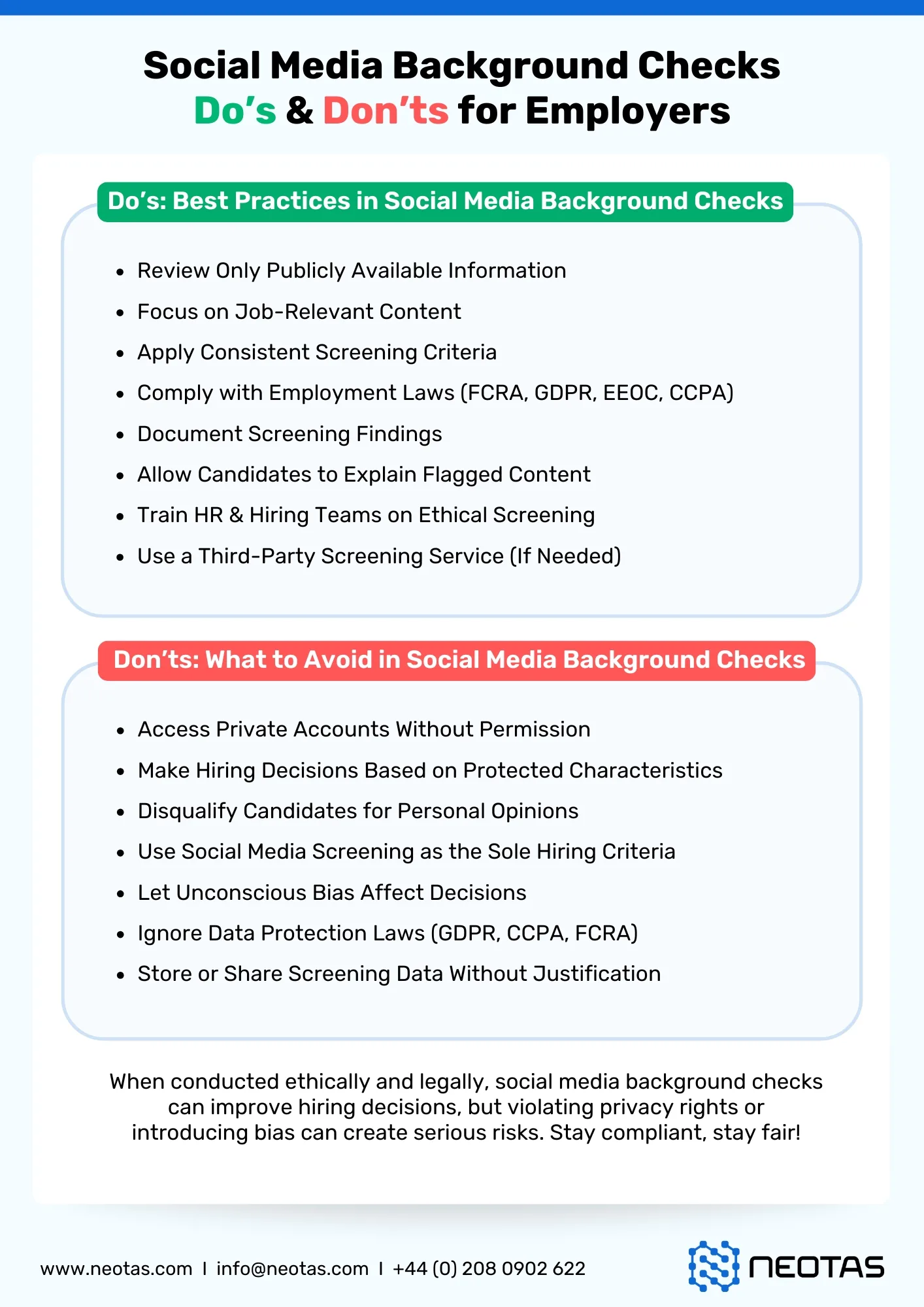
How Employers Can Implement Ethical Employee Social Media Policies



Final Takeaways: How HR Can Build a Fair & Compliant Screening Policy
For businesses to leverage social media screening effectively, they need a structured, legally compliant, and ethical policy.

- Define what is being evaluated and what is off-limits.
- Ensure all candidates and employees are treated equally.

- GDPR (UK/EU) and FCRA (US) require consent for third-party screening.
- Be transparent about the screening process.

- Ensure human oversight to prevent misinterpretation or bias.
- AI should be used as a tool—not as the final decision-maker.

- Keep HR teams updated on legal changes in social media screening.
- Train recruiters to avoid bias and ensure ethical hiring practices.
By adopting fair and compliant screening practices, businesses can protect their reputation, improve hiring quality, and avoid legal risks. The key is to balance technology with ethical responsibility, ensuring hiring decisions are fair, objective, and legally sound.
Neotas Social Media Background Checks and Social Media Screening
At Neotas, We understand the importance of conducting thorough and compliant Social Media Screening Checks, and our team of experts is dedicated to ensuring that the process is safe and reliable. Receive accurate and up-to-date information while complying with all relevant regulations, including GDPR and FCRA. Our advanced OSINT technology and human intelligence allow us to uncover valuable insights that traditional checks may miss.
Schedule a call today!
We highlight behavioural risks identified across social media profiles and the wider internet. Neotas supplements the background screening process. Learn more about how we can help you conduct social media screening and background checks in a safe and compliant manner.
Related Case Studies
- Online Screening Uncovers Explicit Content Before Onboarding A Senior Candidate
- Online Reputation Screening Of A Senior Manager Reveals Internal Confidentiality Threat
- Identifying Difficult And Dangerous Senior Managers through Digital Screening
- Name Change Hides Involvement With Fraudulent Activity
- Management Due Diligence Reveals Abusive CEO
- Pre Employment Social Media Screening Helps Firm Avoid Abusive Hiring Candidate
Related Content on Social Media Screening, Background Checks, and Social Media Background Check
- OSINT Background Check | What Makes Neotas Different?
- Social Media Background Checks For Education Industry
- Social Media Check For Teachers
- Social Media check for Lawyers and other legal professionals
- Social Media Check for doctors and healthcare specialists
- Social Media Check for Police Officers
- How Social Media Screening Benefits Our Clients
- AI-Based Social Media Checks Without Human Intervention
- Avoid the cost of a bad hire with online reputation screening
- The Truth About Social Media Screening And GDPR
- How GDPR and FCRA Apply to Social Media Background Checks — The Do’s and Don’ts of Social Media Background Checks for Employers
- Regulatory Compliance in Digital Screening: International view of the emerging Challenges and Opportunities
- Social Media Screening Webinar — Vero Screening X Neotas
- Pre-Employment Background Checks and Social Media Screening – What NOT To Do
- Online Reputation Screening Uncovers Piracy & Data Leak History For Candidate
Neotas Social Media Screening and Online Reputation Screening Services:
- Online Reputation Screening
- Social Media Screening
- Social Media Check
- Neotas Online & Social Media Screening Video
Frequently Asked Questions
Pre-Employment Screening & Pre-Employment Tests
What is pre-employment screening?
Pre-employment screening, also referred to as a background check, is the process of verifying a candidate’s credentials, employment history, criminal record, and other relevant information to assess their suitability for a role. This process helps employers mitigate risks, ensure compliance, and hire trustworthy professionals.
What is a pre-screening test for a job?
A pre-screening test is an initial assessment used by employers to evaluate a candidate’s qualifications, cognitive abilities, personality traits, or job-specific skills before proceeding to further interview rounds. These tests help streamline the hiring process by filtering out unsuitable applicants early on.
What are the three stages of the screening process?
The screening process typically comprises three key stages:
- Application Review – Evaluating CVs, cover letters, and application forms to shortlist candidates based on job requirements.
- Pre-Employment Assessments – Conducting aptitude tests, technical assessments, or personality evaluations to assess candidates’ skills and cultural fit.
- Background Verification – Checking employment history, educational credentials, criminal records, and other relevant details to ensure accuracy and credibility.
How strict is pre-employment screening?
The level of scrutiny in pre-employment screening varies depending on the employer, industry, and job role. Regulated industries such as finance, healthcare, and law enforcement require more rigorous screening, including extensive background checks, drug testing, and credit history evaluations.
Background Checks & Employment Verification
What is meant by a background check?
A background check is a systematic process of verifying a candidate’s past records, including employment history, education, criminal background, financial history, and professional references. This ensures that the information provided by the applicant is accurate and that they meet the organisation’s standards.
What does the background check process involve?
A standard background check process includes:
- Identity Verification – Confirming the candidate’s identity using official documents.
- Criminal Record Check – Assessing any past convictions or legal infractions.
- Employment Verification – Contacting past employers to validate work history and roles.
- Education Verification – Confirming degrees, certifications, and academic records.
- Credit Check – Reviewing financial history for roles that involve handling finances.
- Reference Check – Consulting previous employers or professional referees.
How do HR professionals conduct background checks?
HR professionals usually collaborate with third-party screening agencies or use internal processes to verify candidates’ records. They may contact former employers, educational institutions, and legal authorities, as well as perform social media screening to ensure alignment with company values.
What will be checked in background verification?
Background verification typically includes identity verification, employment history, education credentials, criminal records, credit history (for financial roles), and social media activity. The depth of verification depends on the job role and industry regulations.
Social Media Screening & Online Presence Checks
What is social media screening?
Social media screening is the process of reviewing a candidate’s online presence across platforms such as LinkedIn, Facebook, Instagram, and Twitter. Employers use this to assess professionalism, cultural fit, and potential red flags such as offensive content or unethical behaviour.
What is a social media background check?
A social media background check involves analysing a candidate’s public social media activity to gain insights into their character, values, and behaviour. This helps employers identify any content that may conflict with company ethics or reputation.
What does social media screening involve?
Social media screening typically includes:
- Reviewing posts, comments, and public interactions for offensive or inappropriate content.
- Identifying potential signs of discriminatory behaviour or illegal activity.
- Verifying consistency between the candidate’s resume and their online presence.
- Assessing professional engagement on platforms like LinkedIn.
What social media platforms are checked during background screening?
Common platforms checked include LinkedIn (for professional credibility), Facebook, Instagram, Twitter, and TikTok. Depending on the nature of the role, some employers may also review industry-specific forums or blogs.
What is adverse media screening?
Adverse media screening is the process of identifying negative mentions of an individual in news reports, blogs, or public records. It helps organisations assess potential reputational risks before hiring a candidate or engaging in business partnerships.
What is social screening?
Social screening is a broader concept that includes monitoring an individual’s online activity, affiliations, and reputation to determine their ethical and professional standing. It is commonly used for recruitment, risk management, and regulatory compliance.
What is a social media checker?
A social media checker is a tool or service that automates the review of a candidate’s online presence, flagging potentially problematic content such as hate speech, violence, or unethical behaviour.
What is media screening?
Media screening refers to reviewing publicly available news sources, social media, and digital footprints to assess potential risks associated with a person or entity. This is widely used in due diligence and corporate risk management.
Why is pre-employment screening important?
Pre-employment screening is essential for:
Reducing Risk – Helps identify potential risks such as fraudulent credentials or criminal history.
Ensuring a Cultural Fit – Assesses candidates’ alignment with company values.
Protecting Company Reputation – Prevents reputational damage from hiring individuals with problematic backgrounds.
Enhancing Hiring Accuracy – Ensures the selection of the most qualified and ethical candidates.
What are the legal considerations in background screening?
Employers must ensure that their screening practices comply with data protection laws such as the General Data Protection Regulation (GDPR) and the Fair Credit Reporting Act (FCRA) in applicable jurisdictions. Transparency, candidate consent, and non-discriminatory practices are critical legal aspects.
How long does a background check take?
The duration of a background check varies based on the depth of the verification process. Standard checks can take a few days, while comprehensive checks (including criminal records and financial history) may take one to two weeks.


 Source:
Source:  Consequences of Non-Compliance:
Consequences of Non-Compliance: